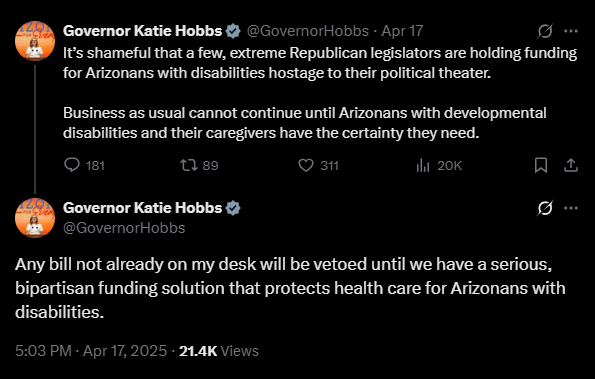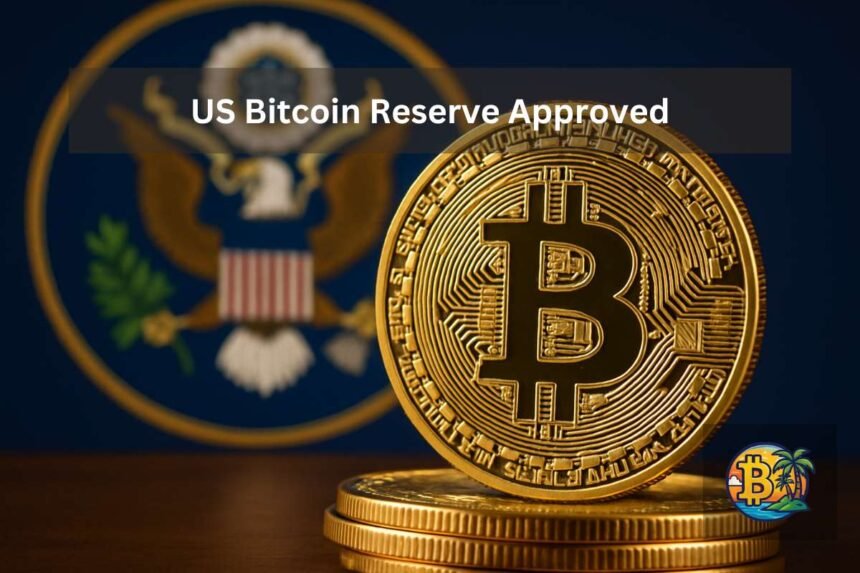Key Insights
- This week, lawmakers in the Arizona House of Representatives have passed two key bills, SB1025 and SB1373.
- These bills propose that the state create a Strategic Bitcoin Reserve by allowing the state treasurer to allocate up to 10% of its assets into Bitcoin.
- As of 2023, Arizona’s state treasury managed more than $31.4 billion in assets.
- Under SB1025, roughly $3.14 billion could be spent on digital assets, and Arizona would hold approximately 31,000 BTC.
- All eyes are now on Arizona Governor Katie Hobbs, whose approval is needed for the bills to become law.
Arizona is on the verge of making crypto history. The US state has just made a major move that could reshape how states manage public funds.
This week, lawmakers in the Arizona House of Representatives have passed two key bills, SB1025 and SB1373, and have effectively paved the way for the state to invest in Bitcoin and other digital assets.
If signed into law by Governor Katie Hobbs, Arizona will become the first U.S. state to hold Bitcoin as part of its official reserves.
Major Move For State-Level Crypto Adoption
Arizona’s House approved Senate Bill 1025 by a vote of 31-25 on 28 April.
This bill proposes that the state create a Strategic Bitcoin Reserve by allowing the state treasurer to allocate up to 10% of its assets into Bitcoin (and likely other high-liquidity digital assets).
SB1373, the companion bill, passed with a slightly wider margin (37-19) and calls for the creation of a Digital Assets Strategic Reserve Fund.

This new Strategic Reserve Fund is expected to serve as a new vehicle for managing already seized crypto and crypto inflows in the future.
Both bills are currently the most advanced reserve initiatives in the US at the state level.
They show a growing trend among state governments like Texas, Florida and New Hampshire to take the risk on digital assets.
They are intended as a way to diversify state portfolios and attract blockchain innovation.
Why Arizona Is Taking This Step
The motivation behind these bills comes in two ways.
For starters, the states in question want to hedge against inflation and future-proof public funds.
State Representative Jeff Weninger, who was a major supporter of SB1025, pointed out the importance of preparing for a future where Bitcoin and other digital assets become a major part of global finance.
The bills are designed to enable (and not mandate) crypto investment.
This means that the state has flexibility while setting this initiative in place, now and in the future.
How Much Could Arizona Invest?
As of 2023, Arizona’s state treasury managed more than $31.4 billion in assets. Under SB1025, up to 10%, or roughly $3.14 billion, could be spent on digital assets. And if that entire amount were invested in Bitcoin at its current price near $95,000, Arizona would hold approximately 31,000 BTC.
This would make the state one of the largest institutional holders of Bitcoin in the world.
For context, this stash would be even higher than the holdings of companies like Tesla and Marathon Digital.
Arizona would likely only come after the federal government and possibly MicroStrategy in terms of Bitcoin ownership.
Built-In Safeguards
While the proposal is highly ambitious, the bills come with several safeguards to protect public funds.
For example, the Digital Assets Strategic Reserve Fund will be auditable on-chain and will therefore be fully transparent.
It also requires strict following of standard fiduciary risk management protocols.
This will help to address issues with Bitcoin’s volatility, as well as other issues like custody and security.
The fund is expected to include assets that the state obtained through civil or criminal forfeitures, in the past and in the future.
In essence, Arizona is looking towards recycling seized or recovered crypto into a usable public reserve.
The Political Shift Toward Crypto
Arizona’s move is part of a larger one from other parts of the US.
Earlier this year, President Donald Trump signed an executive order, which called for a Strategic Bitcoin Reserve and a Digital Asset Stockpile at the federal level.
So far, Wyoming Senator Cynthia Lummis has called for federal legislation that would allow the U.S. government to acquire more than 1 million BTC.
As it is with Arizona, much of this crypto will be sourced from seizures or other budget-neutral means.
These moves on the state and federal levels point to a larger shift in US politica.
What was once fringe policy is now being seriously considered and signed into law, at the highest levels of government.
The Final Hurdle is Governor Katie Hobbs
All eyes are now on Arizona Governor Katie Hobbs, whose approval is needed for the bills to become law.
Hobbs had previously threatened to veto any new spending bills unless lawmakers agree on a bipartisan solution for disability healthcare funding.

That issue was addressed in late April and will likely clear the path for her to focus on the Bitcoin bills.
If Hobbs signs either of these bills into law, it will immediately authorize Arizona’s treasurer to start spending state funds on digital assets.
If she vetoes them, however, it could delay the state’s crypto plans indefinitely, and the nationwide momentum is bound to suffer.
So far, the market has responded positively to Arizona’s moves.
Bitcoin climbed back to around $95,000 after dipping earlier in the month, in a show of renewed confidence from both institutional and retail investors.
If Arizona moves forward, it could set off a domino effect where other states launch their own versions of crypto reserve bills.
This would not only boost state-level crypto adoption, it would also drive blockchain innovation across the U.S.
On an international scale, Arizona’s move could serve as a case study for sovereign governments looking to hedge against inflation.
A Moment for Public Finance
Arizona’s decision to embrace Bitcoin is a major change in how governments are handling public funds in the digital age.
If the Bitcoin reserve bill gains enough traction Arizona would set itself up as a leader in financial innovation within the U.S.
Whether or not Governor Hobbs signs the bills into law, the conversation has already changed.
Digital assets are no longer the speculative investments they were a decade ago.
They’re becoming serious tools for public finance, and Arizona might be the first to take the plunge, but it likely won’t be the last.








